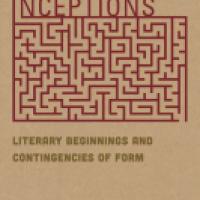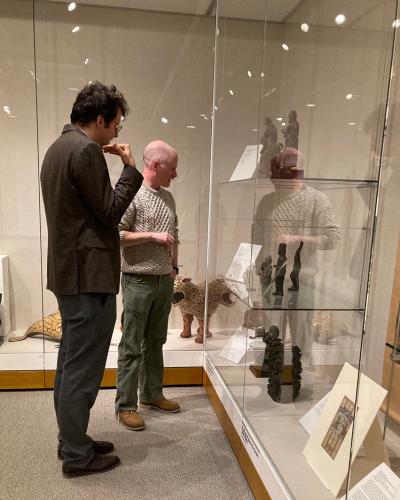This iteration of the Fellows' Q&A series features Kevin Ohi, Professor of English at Boston College and 2016-17 "Skin" Society Fellow. His new book, Inceptions: Literary Beginnings and the Contingencies of Form, was just released on April 6, 2021 from Fordham University Press.
Big Picture
Inceptions explores the concept of beginning—for the literary text, primarily, but also for human consciousness—and explores it as a question not of pragmatics (how it is done, or how has it been done, for example) but of form: the beginning is both internal and external to, is both a part and not a part of, the text it initiates. The book therefore explores some of the paradoxes of how a literary text authorizes itself, how it gets going when that initiating gesture is in some sense neither inside nor outside the text. That incoherence of beginning is a paradox of authority; the text cannot, but also must, reach outside itself to secure its foundation. It is also a paradox of time: the text must pre-exist itself (in order to bring itself into being) even as it lags behind itself (comes after what initiates it). In a different but related way, the fact that our lives and our desires must begin renders them opaque to us; Freud’s psychoanalysis points to the formative self-division of consciousness. Desire and thought are out of synch with themselves, and that asynchronicity can be said, paradoxically, to be originating. “Inception” names this complex temporal and formal structure of initiation; the choice of this term seeks to distinguish it from what is at stake in more common terms such as origin, beginning, and birth. The book explores inception as a question of literary form and of psychological emergence in writers such as Ovid, Milton, Shakespeare, Wordsworth, Dickens, Henry James, George Eliot, Wallace Stevens, Carson McCullers, James Baldwin, and Eudora Welty.
Inceptions traces an ethics of reading, the possibility of perceiving, in the ostensibly finished forms of lives and texts, the potentiality inherent in their having started forth.
Inception introduces a fundamental contingency into texts and psyches alike: in the beginning, all could have been otherwise. On the one hand, the result is a kind of deformation. Inception marks every created form with an exteriority it cannot contain; to have a form is to see that form ruined from the start. On the other hand, the contingency that marks the fact of having a beginning means that the life, and the work, is never done. In inception, and the potential it embodies, it is possible to see making and unmaking coincide within the mechanism of creation. Most explicitly for Henry James, for whom “revision”—a refusal to have done with any work, a striving, therefore, to keep it perpetually at the border of its emergence—was a fundamentally ethical practice, attention to inception is thus a commitment to human freedom; a similar commitment is legible in all the writers examined in the book. To experience this vibrancy, the sense that the work might have been, might still yet be, otherwise, it suffices, as James reminds us, to reread it. In that sense, Inceptions traces an ethics of reading, the possibility of perceiving, in the ostensibly finished forms of lives and texts, the potentiality inherent in their having started forth.
In Particular
Joseph Brodsky points out (in an essay on Auden) that the meter of a poem takes shape with the second line, not the first. One can see some consequences for this by looking at Ovid’s meters. Prior to the Metamorphoses, Ovid was famous for his use of elegiac couplets: in these couplets, a hexameter line is followed by a pentameter line. In the Amores, Ovid playfully suggests that Cupid has "stolen" a foot from (dactylic) hexameter; the meter of his love poems, according to this joke, is a limping modification of the traditional meter of epic.. At the beginning of the Metamorphoses, then, it is only at the end of the second line that one realizes that he is not writing elegiac couplets—in spite of the way the line has in fact led us to expect that he would be. At the end of the second line, the final foot of dactylic hexameter reappears; Ovid is back in the meter of the epic. Metrically, the poem takes shape a line after it has, empirically, begun. The chapter on the Metamorphoses in Inceptions explores some of the ways that the question of beginning preoccupies Ovid’s poem, and dwells, too, on a certain textual uncertainty in the second line that further ramifies these questions. Without going into detail, however, one can see here a gap between two different kinds of beginning—or can see ways that, in this beginning, the text is out of synch with itself. “Inception” is the term through which I name that productive asynchronicity.
Ohi cover.jpg
Alt Text
Ohi CoverA different kind of quandary of inception is visible in the narration of queer childhood. In retrospect, it is perhaps clear to many of us that we were destined to be the queer people that we are today; in childhood, and perhaps already exhibiting the very signs we later read so confidently, that outcome was far from clear. Is there a way to validate the gay outcome without dismissing as mere confusion the earlier moment of non-formation or uncertainty? This is not only a narrative problem—of how to render, truthfully, the experience of “proto-gay” experience. It is also problem that traverses queer theory. Eve Kosofsky Sedgwick long ago pointed out the political and ethical imperative of acknowledging that some children will become gay; homophobic and sexually normative forces strive to prevent that kind of realization, and it is important for queer critics to counter the desire of mainstream culture to erase the traces of gay incipience. Sedgwick and others (such as Kathryn Bond Stockton and James Kincaid) also made visible the category of the “proto-gay child”—a category that, to mean anything, must include not only those kids who will become gay but also those kids who, though potentially gay, turn out to be straight. Can one make such a structure of incipience visible without erasing it —by making it synonymous either with a future gay identity or with its negation? The “child” as such might then be said to be queer insofar as it is the locus of potentiality. The chapters that address these questions in Inceptions attempt to spell out some of the ways that effects of perspective and of literary language allow texts to sustain this equipoise, and to present the paradoxes of queer beginning from within.
Discovery
Detailed readings of literary texts (and films) are perhaps always surprising. No matter how elaborated the conceptual framework one brings to them, such texts, once they are examined in detail, seem inevitably to cast up into view something (usually more than one thing) that doesn’t fit. Returning then to the conceptual framework that has made it possible to apprehend these details in the first place, one’s ideas, almost imperceptibly, shift. I am continually surprised by the surprise that I can experience returning again to texts, and even sentences, that I know well. It’s humbling, perhaps, but also inspiring, to find that there is nearly always something that I have missed—something I have passed over too hastily, some complexity I have been too dull to register. Most of the texts I address in the book I have read and taught multiple times; rereading them as I thought about the question of literary beginnings brought many such surprises. Each reading is in this sense an inception; read in this way, “surprise” is another name for the staggered temporality of realization that I explore in the book.
Fellowship
My project on “skin” was the beginnings of a different book—one that I hope to finish soon. I was working on both projects during my year at Cornell. The present book was shaped most tangibly by the other fellows in my cohort—by our weekly discussions in the seminar led by Tim Murray, by the stray readings ostensibly unrelated to my projects but nevertheless fertilizing, by the expertise that I found that I could draw on by asking people random questions. There was also the inspiration provided by the intellectual excitement of the place—the excitement of being around a group of people deeply invested in their projects in the humanities. The details in that sense almost didn’t matter, although it was often in the details that inspiration was to be found. The particular epiphanies I could not have planned for, and no doubt there were some wasted afternoons and lunches where consolidating insight didn’t arrive. It’s impossible to think that such epiphanies would have happened at all without a place organized so deliberately to foster the accidental, fortuitous illumination.






